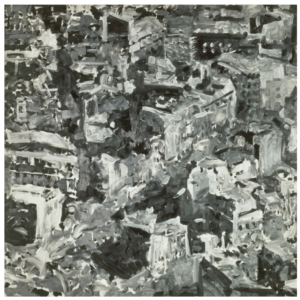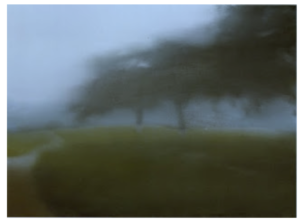
So there I am, after a walk, away from the event, a time and place, but also separated and disconnected by a stretch of time and space from the studio. In the doldrums, a no man's land, with no purpose to recall events, revisit my memories of a location, to recall the textures of a rock or boulder field, employing my LHM, piecing together elements of a walk to remember a place in a time. Maybe this is an important aspect; to let memories develop, mature and sink in, to sleep on the event, and to allow for those episodic memories to pass over to the area of the brain that encodes long-term memories. However, when it's time to recall memories, what exactly will I be recalling, how accurate is my recall and what aspect do I find myself recalling? Is accuracy and details important? How much will my mind wander and my romantic imagination for the hills take over?
"Memory storage comes down to two factors: emotion and repetition," says Dr Fiona Kerr, "If you have a strong emotional or sense-related connection with a person, the storage path to their name will be stronger. "If it wasn't [an emotional experience] our brains slot it into our short-term memory and we tend to get rid of stuff that we don't come back to,"
"Names that are used on a regular basis are recalled easier due to repetition learning. By making your brain pay additional attention, your chances of recalling the names later are greater. You won't blank out if you have some sort of funny riddle or something that will make you remember that person's name next time," Dr F. Kerr.
http://www.abc.net.au/news/2017-09-25/why-do-we-forget-peoples-names/8981020
Have you ever recalled an event with friends or family and are at odds with the narrative, the context; the location, the weather, “...it was sunny”, person A, “well it rained most of the time”, says person B, etc. That kind of thing.
There was the notion that memories were fixed, thinking we could recall memories again and again, but in the past decade there has been a paradigm shift. The neuroscientists Daniela Schiller says that we know now that this is only partially accurate. "At first, this does happen, but every time it is retrieved it is then restored in what’s known as ‘Memory Re-Consolidation’".
“Not only are our memories faulty (anyone who has uncovered old diaries knows that), but more importantly Schiller says, "our memories change each time they are recalled. What we recall is only a facsimile of things gone by." Schiller goes on to say that, "...memories are malleable constructs that are reconstructed with each recall. We all recognize that our memories are like Swiss cheese; what we now know is that they are more like processed cheese."
"What we remember changes each time we recall the event. The slightly changed memory is now embedded as “real,” only to be reconstructed with the next recall.
One implication of Schiller’s work is that memory isn’t like a file in our brain, but more like a story that is edited every time we tell it. To each re-telling there are attached emotional details. So when the story is altered feelings are also reshaped.
https://www.psychologytoday.com/us/basics/neuroscience
Schiller says, “My conclusion is that memory is what you are now. Not in pictures, not in recordings. Your memory is who you are now.” So if we tell our stories differently, the emotions that are elicited will also differ. An altered story is also an altered interior life.”
https://www.psychologytoday.com/us/blog/am-i-right/201307/your-memory-isnt-what-you-think-it-is
In an Abstract, to a paper by Fiona N. Newell 2004, she states, “Further evidence from neuroimaging studies suggests that the perceptual processes involved in object and spatial recognition are underpinned by shared neural resources. Taken together, these studies suggest that the traditional view of sensory systems processing object information in an independent manner is breaking down such that, conversely, the wealth of evidence now lies firmly in favour of sensory systems which are highly interactive all along the information processing hierarchy, and which can modulate and affect high-level perceptual outcomes.”
Multisensory Object Perception in the Primate Brain, Chapter 14 Visuo-haptic Perception of Objects and Scenes pp 251
The German artist Gerhard Richter (b. 1932) has produced a series of works that appear blurred that explore the use of photography and memory. He says, in a Guardian article by Tom McCarthy (22nd Sept 2011) Tom suggests that “…the blur serves as a perfect general metaphor for memory…” with Richter stating…"I blur to make everything equal, everything equally important and equally unimportant…"
https://www.theguardian.com/artanddesign/2011/sep/22/gerhard-richter-tate-retrospective-panorama

Gerhard Richter's Townscape Paris. Photograph: Gerhard Richter/Tate

“When I paint from a photograph, conscious thinking is eliminated. I don’t know what I am doing. My work is far closer to the informal than to any kind of ‘realism’. The photograph has an abstraction of its own, which is not easy to see through.” -Richter
http://sites.stedwards.edu/fbrowni/2014/03/04/blurry-landscapes-richter/
I agree with Richter here, photographs can give us an altered reading of what we think we see, it not only distorts the subject, at the time of taking the photography and our instant viewing and replay of the image, but then this has an additional impact on our memory of that event, scene or subject, which following on from Schiller, is distorted again, a further facsimile. The camera can changes;
- Perspective - the lens distorts space.
- Light - It can overcompensate - different lighting conditions, how many times have you taken a photo of clouds and have been a grey or blank muted tone, the aperture overcompensates. This is why when I am working ‘in the field’ and teaching I say to students take many photos of the same location look up, down. If using automatic settings or smartphones.
- Colours - It distorts colours, in fact, every camera manufacturer and possibly every camera will not have the exactly the same colour signature, and then printing these out can be distorted again.
However, I feel photographs are double-edged, in that they can help and hinder memory. They can help to aid details, yes, but at the same time they distort the perspective and colours of a subject and in turn, distorts the memory of a location or event.
In his article, The Memory of Photography David Bate writes, "Thus, as “artificial memory” device a photograph intersects with a “natural memory” in complex ways. It can be said that photographic images do not destroy personal memories, but that they interact with them in very specific ways, which may not always be conscious. The binarism implied in the distinction between cultural memory and individual memory collapses as photography re-figures their relationship.
With photographs, memory is both fixed and fluid: social and personal. There is nothing neutral here. As sites of memory, photographic images (whether digital or analogue) offer not a view on history but, as mnemic devices, are perceptual phenomena upon which a historical representation may be constructed. Social memory is interfered with by photography precisely because of its affective and subjective status. So in the demand for an intellectual response to pictures or for the priority of their subjective affect, the concept of “screen memories” offers an alternative framework. As composite formations, photographs, like childhood memories, have a sharpness and innocence that belie meanings that have far more potential significance than is often attributed to them, which means that in terms of history and memory, photographs demand analysis rather than hypnotic reverie.
https://www.tandfonline.com/doi/full/10.1080/17540763.2010.499609
The Neurologist Daniela Schiller again, writing in a paper in 2011, saying…“It is now widely recognized that human memory is not an exact reproduction of past experiences but is instead an imperfect process that is prone to various kinds of errors and distortions.”
Daniel L. Schacter, Scott A. Guerin,* and Peggy L. St. Jacques *Memory distortion: an adaptive perspective HNS Manuscript.
As Schiller suggests, memory isn’t like a file in our brain, but more like a story that is edited every time we recall it and when the story is altered feelings are also reshaped.

